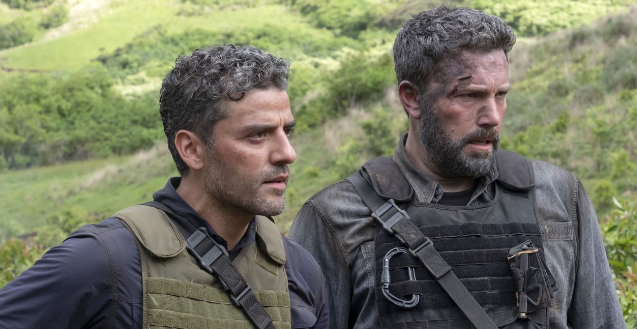Triple Frontier is an entertaining popcorn movie that thinks it’s more than a popcorn movie

The new Netflix action movie follows a group of ex-military men who decide to steal from a drug lord. It has a Kathryn Bigelow type heaviness to it, says critic Luke Buckmaster, who liked this film’s brawn more than its brain.
Director J.C Chandor’s heavy-duty heist movie reunites a bunch of former Special Forces operatives who conspire to rip off a South American drug lord. Pecuniary anxiety and ill feeling towards their post-military lives – one is flogging condos, for instance, another is giving pep talks for the army, and all are disillusioned – comprises the rationale for bursting all guns blazing into the criminal domain. The film packs grunt and a certain Bigelow-ian heaviness; it’s no surprise that the script was co-written by Mark Boal, who penned Zero Dark Thirty and The Hurt Locker.
Even when the focus is on larceny – with the sort of scenes that in other movies involve floor plans on whiteboards – Triple Frontier feels campaign-oriented, almost procedural, the military experiences of the battle-hardened men influencing the film’s form and structure as well as its content. Elements of the story explore lust for material wealth, with conflicting ideas from both the characters and the screenwriters (Boal and Chandor) about whether these shortchanged men are greedy, or morally justified, or both.
It’s a little on the nose, with ringleader Pope (Oscar Isaac) recruiting the team by firing off rounds of neat pressure-packed dialogue, tapping into feelings of injustice. “You’ve been shot five times for your country and you can’t even afford a truck. That’s the real crime,” he says to divorced dad and frustrated realtor Redfly (Ben Affleck, giving another stoic but effective performance), who agrees to come on board after a bit of arm twisting.
Redfly then seizes the podium, and the subtext-explaining baton, for himself, declaring to colleagues including Ironhead (Charlie Hunnam) and Ben (Garrett Hedlund) the sort of moral stakes at play. “You cannot go back to your normal life after tonight,” he grumbles. “We do not have the flag on our shoulders, and no amount of bullshit that we tell ourselves is gonna change that…you guys need to own the fact that you are desecrating most of the oaths you ever took.” Desecrate away! The audience will say; no-one wants these blokes to behave ethically.
More interesting than Triple Frontier as a cautionary tale about conscience and money-chasing (consult The Treasure of the Sierra Madre for the best film of this kind) is the way their elaborate robbery plays out: in broadly the same manner and with the same kind of professionalism one might expect one of their previous, official endeavours. So the situation is similar but their motives fundamentally different: for king and country before; myself and my family now. Chander (whose other films include the GFC drama Margin Call and the oceanic survival tale All is Lost) doesn’t draw any deep observations from the sticky dichotomy between these motivations, ultimately falling back on pretty safe messages, but nor is the film devoid of contemplation.
The action is soberly choreographed, free of the rat’s nest of many wham-bam-slam contemporary action movies, made by directors attempting verisimilitude through kineticism, which often results in visual gibberish – as if we should be dazzled by the filmmaker’s ability to measure the space between cuts in milliseconds. And the drama, while limited, is at least a little enhanced by an obvious attempt to be a ‘thinking person’s’ genre piece, the philosophical currents underneath the drama not so much misguided as underdeveloped. In short: Triple Frontier is a popcorn movie that thinks it’s better than a popcorn movie. ‘Delusions of grandeur’ is a little strong, but you get the point. Its brawn is more impressive than its brains.

















